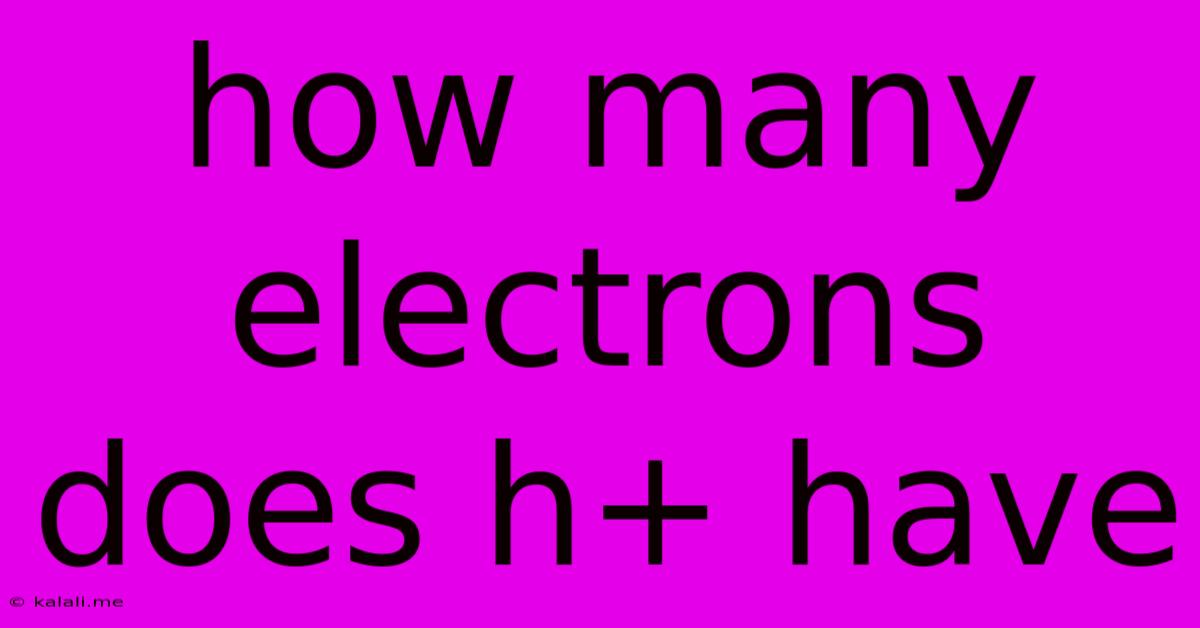How Many Electrons Does H+ Have
Kalali
Jun 15, 2025 · 2 min read

Table of Contents
How Many Electrons Does H⁺ Have? Understanding the Hydrogen Ion
The question of how many electrons a hydrogen ion (H⁺) possesses is deceptively simple, yet crucial for understanding fundamental chemistry. The answer, in short, is zero. This seemingly straightforward response, however, unlocks a deeper understanding of atomic structure, ionization, and the behavior of this ubiquitous ion. This article will delve into the specifics, explaining why H⁺ has no electrons and its implications.
The Structure of a Hydrogen Atom
To grasp the electron count in H⁺, we must first understand the neutral hydrogen atom. Hydrogen, the simplest element, typically consists of one proton in its nucleus and one electron orbiting that nucleus. This single electron occupies the atom's single electron shell, representing a stable, albeit simple, atomic structure.
Ionization and the Formation of H⁺
The hydrogen ion, H⁺, is formed through a process called ionization. This involves the removal of one or more electrons from a neutral atom. In the case of hydrogen, losing its sole electron results in a positively charged ion, H⁺, because the positively charged proton is no longer balanced by the negatively charged electron. This process often occurs in acidic solutions where hydrogen atoms readily lose their electrons.
The Significance of the Zero Electron Count in H⁺
The absence of electrons in H⁺ significantly impacts its chemical properties. Since electrons are responsible for chemical bonding, the hydrogen ion's lack of electrons means it possesses a strong electrostatic attraction for negatively charged species. This makes it highly reactive and a key player in many chemical processes, including:
- Acid-base reactions: H⁺ readily reacts with bases (which have a surplus of electrons) to form water and salts. Understanding this interaction is fundamental to acid-base chemistry.
- Biological processes: H⁺ plays a crucial role in many biological processes, influencing pH levels and affecting enzyme activity. The proton gradient across cell membranes, for example, is vital for energy production.
- Catalysis: H⁺ often acts as a catalyst, speeding up various chemical reactions by interacting with reactants and lowering activation energy.
Common Misconceptions
It's important to clarify some common misconceptions surrounding H⁺:
- It's not a bare proton: While often simplified as a bare proton, in reality, H⁺ interacts strongly with its environment. In aqueous solutions, it's frequently hydrated, meaning it's surrounded by water molecules. This interaction is essential to its behavior in solution.
- It's not a hydrogen molecule: H⁺ is distinctly different from a hydrogen molecule (H₂), which consists of two hydrogen atoms sharing electrons covalently. The H⁺ ion is a single proton, devoid of any electrons.
Conclusion
In conclusion, the hydrogen ion (H⁺) has zero electrons. This seemingly simple fact underpins its fundamental role in various chemical and biological processes. Its strong positive charge and lack of electrons dictate its reactivity, making it a key player in a vast array of reactions and systems. Understanding the properties of H⁺ is crucial for a comprehensive understanding of chemistry.
Latest Posts
Latest Posts
-
Which Of The Following Is A Characteristic Of Emotions
Jun 15, 2025
-
Sample Letter To Bank To Close Account
Jun 15, 2025
-
Examples Of Direct Current And Alternating Current
Jun 15, 2025
-
University Of Maryland Eastern Shore Gpa Requirements
Jun 15, 2025
-
A Perfectly Competitive Firm Faces A Demand Curve That Is
Jun 15, 2025
Related Post
Thank you for visiting our website which covers about How Many Electrons Does H+ Have . We hope the information provided has been useful to you. Feel free to contact us if you have any questions or need further assistance. See you next time and don't miss to bookmark.